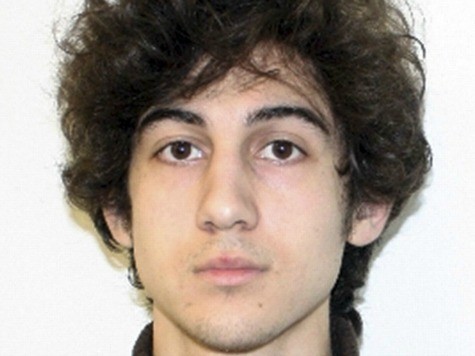(AP) Marathon suspect wants prison restrictions lifted
By DENISE LAVOIE
AP Legal Affairs Writer
BOSTON
Lawyers for Boston Marathon bombing suspect Dzhokhar Tsarnaev asked a judge Wednesday to lift restrictions placed on him in prison, arguing that the conditions are overly harsh, have left him nearly totally isolated and are impairing their ability to defend him.
Tsarnaev’s lawyers said in a motion filed in court that he has been confined to his cell except for visits from them and has “very limited access” to a small outdoor enclosure.
Tsarnaev, 20, is accused of building and planting bombs near the finish line of the April 15 marathon, killing three people and injuring more than 260. Authorities say he and his older brother, Tamerlan Tsarnaev, 26, ethnic Chechens from Russia who emigrated to the United States as children, planned and carried out the attack to retaliate against the U.S. for its involvement in Muslim countries.
Tamerlan Tsarnaev was killed four days after the marathon following a gun battle with police. Dzhokhar Tsarnaev was found wounded and hiding in a boat in a backyard in Watertown. Authorities said he had scrawled anti-American messages on the inside of the boat, including “The U.S. Government is killing our innocent civilians” and “We Muslims are one body, you hurt one you hurt us all.”
In their motion, Tsarnaev’s lawyers said “Special Administrative Measures” were imposed on their client beginning in August, at the request of U.S. Attorney Carmen Ortiz and the approval of U.S. Attorney General Eric Holder.
The measures restrict access to the mail, the media, the telephone and visitors.
Tsarnaev’s lawyers say prosecutors have presented no evidence that the special restrictions are needed in Tsarnaev’s case.
They also said the special measures limit Tsarnaev’s interaction with people who are helping the defense and restrict the communications and other activities of the defense team.
A spokeswoman for Ortiz did not immediately return a call seeking comment.
In a memo outlining the factual basis for the restrictions, prosecutors said Tsarnaev “reaffirmed his commitment to jihad and expressed hope that his actions would inspire others to engage in violent jihad” while he was being interviewed by the FBI after he was captured.
The government also notes that Tsarnaev has gained “widespread notoriety” since his arrest and has received nearly 1,000 pieces of unsolicited mail.
His lawyers said Tsarnaev has not responded to any of the mail, which they said is not “jihadist” in nature, but instead consists almost entirely of letters and cards from people “who believe he is innocent and people urging him to repent and convert to Christianity.”
The motion was submitted by federal public defenders Miriam Conrad, William Fick and Timothy Watkins, and San Diego attorney Judge Clarke, a death penalty specialist. Conrad declined to comment on the filing.
Tsarnaev’s lawyers argue that the special measures allow them to share information they obtain from Tsarnaev among themselves by phone or in person for the purpose of preparing his defense, but prohibit them from sharing that information by mail “under any circumstances for any purpose.”

COMMENTS
Please let us know if you're having issues with commenting.